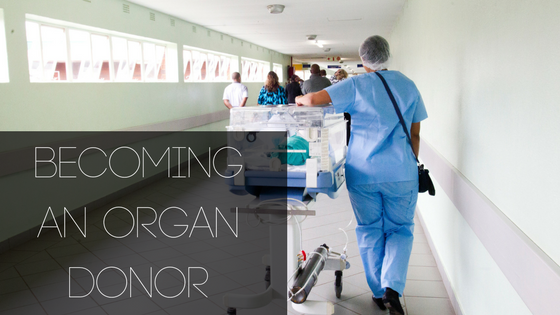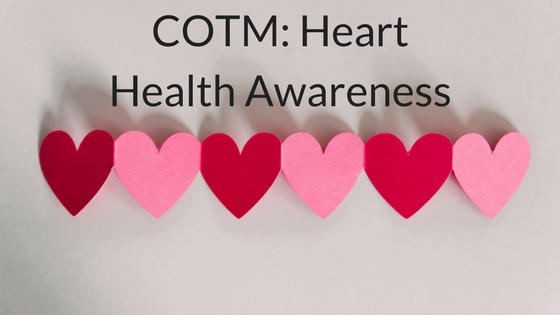Tagged: healthy
Becoming an Organ Donor

Every day, thousands of people wait on a list to receive an organ transplant. Many of these people never receive the organs they need to survive and pass away. It is a terrifying thought that one day you or a loved one may be in this position. However, many people are afraid of donating their organs for many reasons. Today, I want to give you some facts so that you are able to make an informed decision about whether or not to be an organ donor.
1) One donor can save many people.
Think about how many transplants you could provide. Not only can you donate organs, you can also donate tissues that would help people greatly. These can include bone, skin, and veins amongst others. Not only would you be able to help people with malfunctioning organs, you could also help those who have other conditions that impair their body.
2) Your blood type may make the difference.
Have blood type O? Your donations can make a huge difference, as people with type O blood can only receive donations from the same type. In fact, any blood type can receive type O blood or organs, which makes them the most valuable donors. That being said, even if you don’t have type O blood, you should still donate. Type A and B can receive their own type or O, while type AB can receive any.
3) Liver and kidney disease kills a lot.
In fact, these diseases kill more people than Alzheimer’s, breast cancer, or prostate cancer. Donating your organs would give more people the opportunity to live, and hopefully together we can decrease that number enough to make a big difference. It may seem unlikely, but if many people banded together, they could possibly save 3 lives apiece (one from a liver transplant and two kidney transplants) and cut down that statistic quickly.
4) You can donate while you are alive.
Sure, you can’t donate your lungs or liver while you are alive, but you can always donate a kidney. Your lifestyle would likely change drastically, though, so be aware of that before committing to anything. Keep this in mind if a loved one ever needs a transplant, as there is a much better chance of survival and less time waiting for a donor if a matching family member donates.
Donating an organ may sound scary, but it isn’t. It is a necessity for many people, and your donation could save many lives. Consider these facts and statistics, and think about what you would want someone to do if you were on the transplant list. We often don’t like thinking about death or illness, but thousands of people face these realities every day, and your help could brighten their future just a little while longer.
COTM: Heart Health Awareness

February may be bleak and dreary, but it also signifies a cause that is close to many of us: heart health awareness. Almost all of us can think of someone we know or have heard of who has had a heart condition. Over 600,000 people die every year from a heart-related condition in the US, and it is the second leading cause of death in Canada. What can we do to learn more about heart disease, help spread awareness, and give back to charities that help this cause?
Learning About Heart Disease
Heart diseases affect millions of people each year, and, as stated previously, hundreds of thousands of those people die each year from a heart-related incident. There are quite a few conditions that can cause health issues or death, such as arrhythmia, high cholesterol, high blood pressure, and heart attack. You can read about illnesses of the heart on the American Heart Association’s website and find out if you are at risk of contracting one of these illnesses.
Furthermore, it is important to understand the factors that can bring on a heart diseases. High blood pressure and cholesterol are both factors, but stress, smoking, diabetes, and drug/alcohol abuse are all major factors for an increased risk. Family history, sex, and age are also factors. If you have concerns that you may be at a high risk, talk to your doctor to find out how to live a healthy lifestyle and decrease your risk.
Educating Others
One problem with heart disease is that many people are uneducated about the associated factors and symptoms. Many people are unaware that a heart attack can present itself differently in women than in men, although symptoms are often similar. To help with this problem, familiarize yourself with signs of a heart attack and a stroke and speak to your loved ones about what to do if they feel this way. Both a heart attack and a stroke can turn fatal in mere minutes, so it is important for anyone experiencing symptoms to call 911 and get to a hospital as quickly as possible.
Donating To Fight Heart Disease
Every day, researchers are studying ways to reduce and eliminate heart disease. Many charities are also hoping to spread awareness to high-risk individuals and average people alike. If you are in the US, you can donate to the American Heart Association, while Canadians can donate to the Heart and Stroke Foundation of Canada. Your donation may help save someone’s life, and I encourage everyone to donate at least a small amount.
Heart disease can destroy families, and it is extremely prevalent. It may not be completely avoidable, but there are many ways to limit your risk and the risk of your loved ones. Please take the time to familiarize yourself with heart attacks, strokes, and other diseases, and share this information with everyone you know. Your help will make a huge difference in helping to eradicate heart disease.